A new report from the Joint Center for Housing Studies of Harvard University digs into the housing market for older Americans, finding more evidence of a widening gap between each end of the wealth spectrum.

The Joint Center for Housing Studies of Harvard University this week released the "Housing America's Older Adults 2019" report, finding increasing housing inequality among older Americans.
"Between 2012 and 2017, the number of households headed by someone 65 or older jumped from 27 million to 31 million and will continue to grow. At the same time, the number of older adults facing housing cost burdens reached an all-time high of 10 million," according to a press release announcing the study.
The report also identifies a growing gap between the haves and the have-nots: "Between 2012 to 2017, the incomes of households age 65 and over in the top 10 percent increased by 22 percent while incomes of those in the bottom 10 percent fell by 4 percent. Additionally, the median income for the highest earners between the ages of 50 and 64 set a new record of nearly $204,000 in 2017, while the median income for the lowest earners, $14,400, was lower than the 2000 level of $17,100."
The website shares the report also includes interactive maps and infographics built from data reported in the report.
Lois A. Bowers picked up news of the report for McKnight's Senior Living, focusing on five takeaways from the report, with a lot more details included in the article:
- The need for affordable housing, supportive services will increase.
- Moves will increase; services will be needed.
- Many older adults prefer larger buildings.
- Cost burdens lead to food, healthcare issues.
- Some areas are worse than others when it comes to housing cost burdens.
FULL STORY: Housing America's Older Adults 2019

Planetizen Federal Action Tracker
A weekly monitor of how Trump’s orders and actions are impacting planners and planning in America.

Restaurant Patios Were a Pandemic Win — Why Were They so Hard to Keep?
Social distancing requirements and changes in travel patterns prompted cities to pilot new uses for street and sidewalk space. Then it got complicated.

Map: Where Senate Republicans Want to Sell Your Public Lands
For public land advocates, the Senate Republicans’ proposal to sell millions of acres of public land in the West is “the biggest fight of their careers.”

Maui's Vacation Rental Debate Turns Ugly
Verbal attacks, misinformation campaigns and fistfights plague a high-stakes debate to convert thousands of vacation rentals into long-term housing.

San Francisco Suspends Traffic Calming Amidst Record Deaths
Citing “a challenging fiscal landscape,” the city will cease the program on the heels of 42 traffic deaths, including 24 pedestrians.

California Homeless Arrests, Citations Spike After Ruling
An investigation reveals that anti-homeless actions increased up to 500% after Grants Pass v. Johnson — even in cities claiming no policy change.
Urban Design for Planners 1: Software Tools
This six-course series explores essential urban design concepts using open source software and equips planners with the tools they need to participate fully in the urban design process.
Planning for Universal Design
Learn the tools for implementing Universal Design in planning regulations.
Heyer Gruel & Associates PA
JM Goldson LLC
Custer County Colorado
City of Camden Redevelopment Agency
City of Astoria
Transportation Research & Education Center (TREC) at Portland State University
Camden Redevelopment Agency
City of Claremont
Municipality of Princeton (NJ)





























